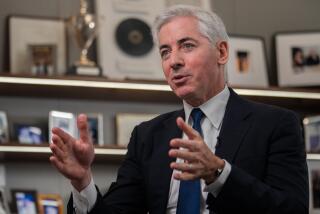Beckman Gets Angry When He Reflects on SmithKline
- Share via
When Arnold O. Beckman agreed to sell the medical instruments firm he founded to SmithKline Corp. six years ago, he had high hopes that the pharmaceutical giant would give Beckman Instruments the resources it needed to expand and diversify.
Today, frustrated and disappointed, Beckman wants the marriage dissolved.
“I hate to see Beckman Instruments’ welfare be dependent upon SmithKline,” said Beckman, 88, who retired in 1986 and no longer plays an active management role in either organization.
Beckman’s sentiments underscore the fact that even though SmithKline’s $1-billion merger with Beckman Instruments has produced some benefits for both companies, many that were anticipated never fully materialized.
Beckman flatly predicted that SmithKline and Beckman Instruments will eventually go their separate ways. SmithKline executives haven’t ruled out that possibility, and they recently increased the distance between the two firms.
In November, SmithKline spun off 16% of Beckman Instruments by selling stock in the subsidiary to outside investors. Beckman Instruments shares are now traded on the New York Stock Exchange.
The move prompted speculation in some quarters that SmithKline might follow up by selling more stock or divesting Beckman Instruments entirely.
SmithKline Chairman Henry Wendt recently told analysts that the partial spinoff “could be viewed as a first step” in that direction.
The Beckman Instruments spinoff was one of several measures undertaken by SmithKline as part of an offensive to shore up the corporation’s declining profit and shaky reputation on Wall Street. The company’s principal product, the ulcer medicine Tagamet, has lost sales to its competitors, and SmithKline is under pressure to reverse its fortunes.
The rescue plan, which includes the layoff of 1,600 employees, was announced in September along with the company’s prediction that its 1988 earnings would fall as low as $458 million, down 20% from $570 million in 1987.
But amid rumors of a possible hostile takeover of the corporation and the resignation of top corporate officials, including President George W. Ebright, industry analysts have been clamoring for even stronger medicine.
SmithKline observers said Ebright had been unhappy with efforts to give more autonomy to the company’s subsidiaries, including Beckman Instruments. Other subsidiaries identified by Wendt as candidates for partial or total spinoffs are Allergan Inc., an eye and skin care company based in Irvine, and SmithKline Bio-Science Laboratories, which operates a chain of clinical laboratories including a large facility in Van Nuys.
“We intend to realize the true value of these businesses for our shareholders by separate visibility and accountability and possibly even direct ownership,” Wendt recently told securities analysts. He said direct ownership could be accomplished by distributing shares to existing SmithKline shareholders instead of selling them through securities firms.
Autonomy Would Be Restored
The reason for showcasing the subsidiaries by allowing their stock to trade separately is clear. Between 1985 and 1988, Beckman Instruments, Allergan and SmithKline Bio-Science Laboratories more than doubled their combined operating income to $257 million from $122 million. During the same time period, SmithKline’s operating income barely rose.
No matter what benefits a complete spinoff of Beckman Instruments might bestow on SmithKline shareholders, it would restore Beckman Instruments’ pre-1982 autonomy.
And nobody wants that more than Arnold O. Beckman, now a retired philanthropist who spends much of his time keeping tabs on the latest brain and laser research.
Beckman hasn’t played an active role in the management of Beckman Instruments since the merger, and he stepped down from the SmithKline board in April, 1986. Today he is an “emeritus,” non-voting director of both organizations.
Beckman established Beckman Instruments in a Pasadena garage in 1935, building a business on the strength of his first commercial invention: a pH meter originally created to measure the sourness of lemon juice but ultimately found to have a myriad of laboratory uses. The company now makes a wide variety of instruments used in the diagnosis of disease, in university research and for quality control in the manufacture of drugs.
Though retired, Beckman continues to be concerned about the company “because it carries my name, and I have 50 years of my life tied up in it,” he said in a recent interview.
Beckman said he agreed to vote his 18% ownership interest in favor of the 1982 merger because he believed that the deal would be mutually beneficial. At the time, he said, SmithKline was looking to diversify so it would not be as dependent on Tagamet, which once reigned as the world’s best-selling prescription drug.
‘Golden Opportunity’
He said Beckman Instruments, which was in need of additional funds for product development, thought it might catch some of the cash that Tagamet was showering on SmithKline.
“We were healthy at that time,” Beckman recalled. “We grew at 25% a year. But we could grow still more and we decided here was a golden opportunity.”
But shortly after the merger, Beckman Instruments was rocked by a reduction in Medicare reimbursements. Following years of double-digit sales growth, the firm’s operating income fell in 1983 and 1984 as hospital customers cut back purchases of new diagnostic equipment to compensate for Medicare cuts.
Analysts soon began to question whether the $1 billion that SmithKline paid to acquire Beckman Instruments was too much. Observers also began to question the company line that the acquisition of Beckman Instruments’ analytic and diagnostic health-care instruments would complement SmithKline’s drug and clinical laboratory service group and bolster the company’s position in emerging biotechnology markets.
In 1984, SmithKline Beckman sold Beckman Instruments’ industrial components and equipment group to Emerson Electric. The unit represented about 20% of Beckman Instruments’ total sales. SmithKline said industrial instruments were not part of the health-care industry on which it intended to concentrate.
The breakup of his company did not sit well with Arnold Beckman.
“I was not happy with that,” he said. “I felt physical anger. Management did not realize the potential that there was in these fields.”
SmithKline Chairman Wendt declined to comment on Beckman’s complaints.
Tom Waller, who retired earlier this year as vice president of Beckman Instruments’ Bioanalytical Systems Group, said “the chemistry is not good” between Beckman and Wendt, who has been SmithKline’s chief executive since 1982.
Edge Wouldn’t Be Lost
According to Waller, Beckman is a scientific visionary who gets excited about solving technical problems, while Wendt is “a numbers man” who is primarily interested in improving quarter-to-quarter earnings.
“I don’t think Henry (Wendt) would know a molecule if he fell over one,” Waller said.
Waller added that although Beckman Instruments kept developing new technology after the merger, it had to reassure many of its customers that the company would not lose its competitive edge under the control of SmithKline.
Beckman and current Beckman Instruments officials noted that one of the major differences between the pharmaceutical and medical instrument business is the shorter research and development cycle required for bringing new instrument products to market. “It is a different kettle of fish,” Beckman said.
Also, Waller said Beckman’s assumption that SmithKline would invest its considerable cash in development of Beckman Instruments’ diagnostic products did not prove true. “They (SmithKline) really didn’t contribute much money to the development of new products. We had to find our own money out of existing operating earnings,” he said.
Ronald Normann, first vice president and senior drug analyst for Paine Webber Inc. in New York, said he does not blame the parent company for not investing heavily in Beckman Instruments, considering how much of a drain it was on SmithKline’s resources shortly after the merger. “You don’t throw money down a hole,” he said.
Beckman Instruments rebounded from the Medicare crunch by cutting personnel, expanding overseas and developing products designed to meet the needs of a cost-conscious medical environment. The company posted net income of $42.5 million on sales of $770 million in 1988, up from net income of $39 million on sales of $691 million in 1987. With its financial comeback, the subsidiary began paying substantial dividends to its parent.
Just how big a part SmithKline played in Beckman Instruments’ turnaround is a matter of dispute. Louis Rosso, Beckman Instruments’ president and chief executive, said the parent company was supportive by becoming Beckman Instruments’ “banker” and retiring the vast majority of the subsidiary’s $200-million debt.
“Beckman Instruments on balance has been fortunate to be part of SmithKline Beckman,” Rosso said.
‘Left to Do Own Thing’
But he also said that the “technical interaction” between Beckman Instruments and SmithKline, while “positive, has not been critical to their or our success.”
Rosso and John James, Beckman Instruments’ treasurer, said the spinoff of Beckman Instruments would not disrupt the company’s operation because “they pretty much left us to do our own thing.” James said the companies did not share sales forces or marketing, as some analysts had anticipated, because the businesses are too different.
David H. McCullum, senior technical analyst in New York for the investment firm of Hambrecht & Quist, said he believes that SmithKline guided Beckman Instruments and the other subsidiaries with more skill than it handled its core pharmaceutical business.
“I question whether Beckman (Instruments) could have solved those problems independently. It didn’t have the management depth or focus or resources,” McCullum said.
Waller, the former Beckman Instruments vice president, said he believes that SmithKline’s large bankroll “kept the sharks away” when the company faced a market upheaval just after the merger.
“We were growing extremely fast and had incurred a lot of debt, and that makes you very vulnerable” to a takeover, he said.
That opinion is shared by Jeff Kilpatrick, an analyst with Newport Securities in Costa Mesa. “It could be that, as part of a larger company, they did better through this rough period,” he said. “It is like having a big brother hold your hand as you cross the street.”
Beckman, for one, disagrees. “We would have come through and survived without SmithKline.”
More to Read
Inside the business of entertainment
The Wide Shot brings you news, analysis and insights on everything from streaming wars to production — and what it all means for the future.
You may occasionally receive promotional content from the Los Angeles Times.









